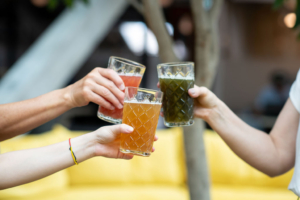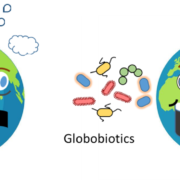Food of the future: Fermented and sustainable
By Dr. Mary Ellen Sanders, ISAPP Executive Science Officer
An exciting research initiative at the crossroads of fermented foods and sustainable diets is underway. Funded by the EU and Switzerland, and coordinated by KU Leuven in Belgium, HealthFerm is a 4-year, 13.1 MM € project involving 23 partners from 10 countries. Prof. Christophe Courtin, KU Leuven, serves as the overall project coordinator.
 HealthFerm seeks to understand how to transition toward more sustainable, healthy diets through leveraging fermented foods and technologies. Its overall aim is to understand the interaction between food fermentation microbiomes, fermented plant-based foods, the human gut microbiome and human health. Many information gaps will be addressed by the project, which is organized around six work projects that are designed to integrate basic research, intervention studies, fermentation technology, consumer behavior and communication strategies.
HealthFerm seeks to understand how to transition toward more sustainable, healthy diets through leveraging fermented foods and technologies. Its overall aim is to understand the interaction between food fermentation microbiomes, fermented plant-based foods, the human gut microbiome and human health. Many information gaps will be addressed by the project, which is organized around six work projects that are designed to integrate basic research, intervention studies, fermentation technology, consumer behavior and communication strategies.
Scientific perspectives on fermented food is at the heart of HealthFerm. Fermented foods were defined in an ISAPP consensus paper as ‘foods made through desired microbial growth and enzymatic conversions of food components’. Predating ancient Egyptian society, fermented foods and beverages are thought to have originated over 8000 years ago, and today over 5000 varieties are enjoyed around the globe, contributing substantially to human nutrition. Fermented foods have many advantages over the raw materials from which they are made, including improved sensory characteristics, safety and stability as well as potential health benefits. How the live microbial components of fermented foods may drive the health benefits of fermented foods is an active area of research.
Prof. Courtin shares some of his thoughts about HealthFerm.
Why focus on fermentation as a means of attaining more sustainable diets?
Courtin: When considering a sustainable diet, we automatically look at replacing part of our animal-based foods with plant-based foods. But plant biomass is often less functional and more recalcitrant than animal-based materials. Look for example at the whipping behavior of egg proteins or the availability of iron. Getting more out of plant fiber through fermentation is also a point of attention. In short, we believe that fermentation can help us functionalize plant materials and make it more nutritious.
Fermented foods have been around a long time. Why do you think now is the time to leverage their benefits?
Courtin: Societies are increasingly interested in fermented foods for a large number of reasons. We want to leverage that. From a scientific point of view, state-of-the-art omics-technologies coupled with bioinformatics allow us to look in depth into food microbiomes better than ever before and use them in a targeted way to functionalize plant materials. In addition, they also allow performing human intervention trials and doing relevant analyses to understand if and how fermented foods can improve human health, focusing on the gut microbiome and cardiometabolic health.
Looking ahead, what is your greatest hope for the project?
Courtin: I hope we can come to a rational design of new fermentation processes and products for the crops we target (faba bean, yellow pea, wheat, oats), using microbial resources we mobilize in collaboration with citizens and companies through community science projects. I also hope we get clear results and mechanistic insights from the intervention trials on the effects of consuming fermented foods and diets.
ISAPP is represented on the HealthFerm Stakeholder Board, which convened its first meeting January 20, 2023.






